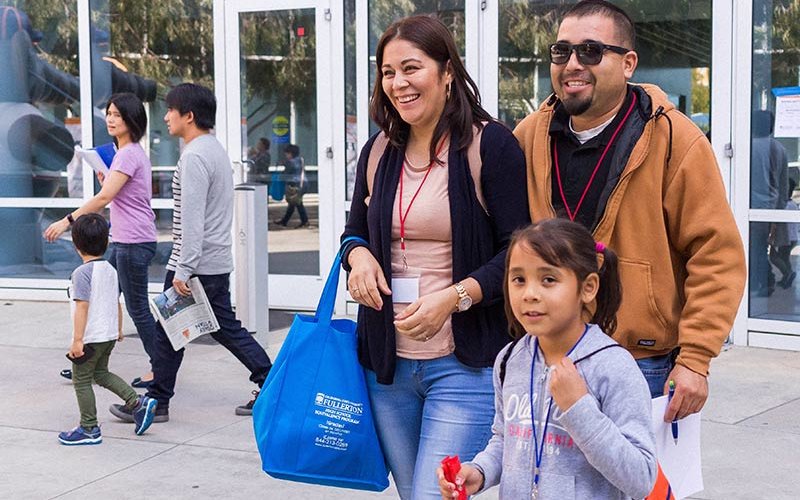
For migrant farmworkers and their families, a life outside of the agricultural fields often seems unattainable. There are often multiple problems. A lack of fluency in English. A sporadic education, at best. Poverty. Lack of transportation and health care. Family responsibilities. And, every day, there is the grueling work of harvesting the food that feeds the nation. Yet there is hope.
In early April, about 100 farmworker students and their families gathered for the third annual University Day program at Cal State Fullerton. During a day filled with a variety of workshops and activities, they learned about different areas of study and career opportunities, took campus tours and heard from CSUF students and faculty about their own challenges and how they could be overcome. The attendees were welcomed by the university’s president, Fram Virjee; Lisa Kirtman, dean of the College of Education; and Kim Norman, chair and professor of elementary and bilingual education. Marco Antonio Fraire, deputy head consul from the Santa Ana office of the Mexican Consulate, also welcomed the guests.
“These students are highly motivated,” said Pablo Jasis, associate professor of education who manages Cal State Fullerton’s High School Equivalency Program (HEP) that helps prepare these workers to take the GED test — and, if they pass, receive a certificate that is the equivalent of a high school diploma — and encourages them to continue on to a college degree.
Three years ago, the university was awarded almost $2.4 million from the U.S. Department of Education to develop and oversee this program until 2020, when it will be due to apply for another five-year cycle.
“Events like this help us create a vision for ourselves and, of course, a pathway to a better life, both personally and professionally,” said one student on an anonymous survey. Another responded, “This was my second year attending and, just like the first, it was a wonderful experience that expands your knowledge and reminds you that you can succeed.”
In an agricultural industry that generates more than $44 billion per year, Hispanic farmworkers make up 96 percent of the state’s agricultural workforce; however, Hispanic farmworkers are the poorest racial demographic with annual household incomes typically below the poverty line, according to the National Agricultural Worker Survey. That’s where the CSUF-HEP Project comes in. It is offered to Southern California migrant farmworkers, their spouses and children with the purpose of increasing future educational and work-related opportunities.
For the past three years, agricultural workers have gathered with the goal of earning their GED. The hope is that some of these students, armed with this certificate, may want to continue on to a college or university, military service or transition to a career track that offers more possibilities. The focus of University Day is to show HEP students and families just how far they can go with a college education.
To help these students, HEP program staff and students reach out to agricultural workers from Coachella Valley, San Bernardino, Fallbrook and Orange County.
“We have to go to them,” Jasis said. “Because of transportation, work or family issues, they often can’t make it to us.”
Patricia Feliz, a graduate student who has been working with HEP participants, serves as HEP program director.
“As a student, I gained a great deal of insight into how difficult it is for migrant farm family members to achieve a high school diploma let alone pursue higher education,” she said. “I am inspired by the sacrifices they make to earn a high school equivalency certification and hopeful that by achieving one of their goals, they will pursue further education.”
The program is evaluated by Cal State Fullerton’s Center for Research on Educational Access and Learning (C-REAL), which helps CSUF-HEP participants and the staff assess the effectiveness of the educational project.